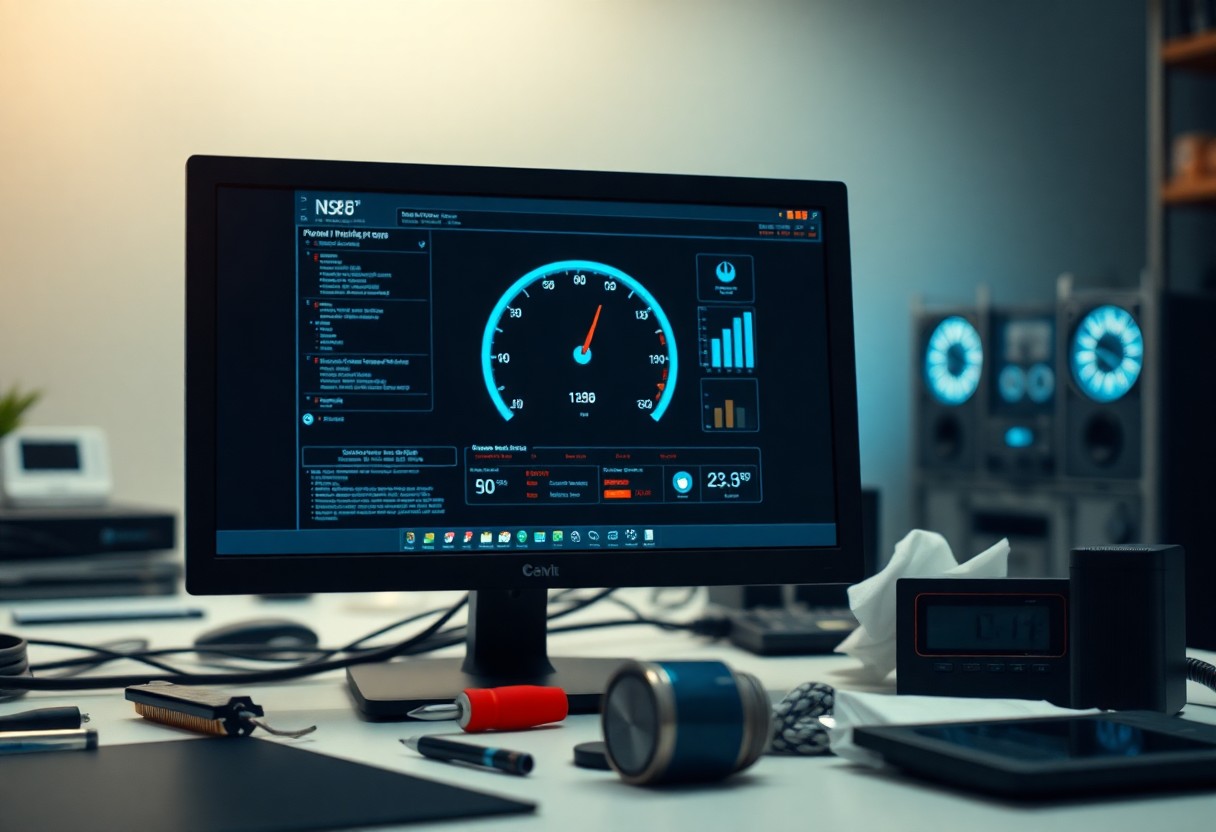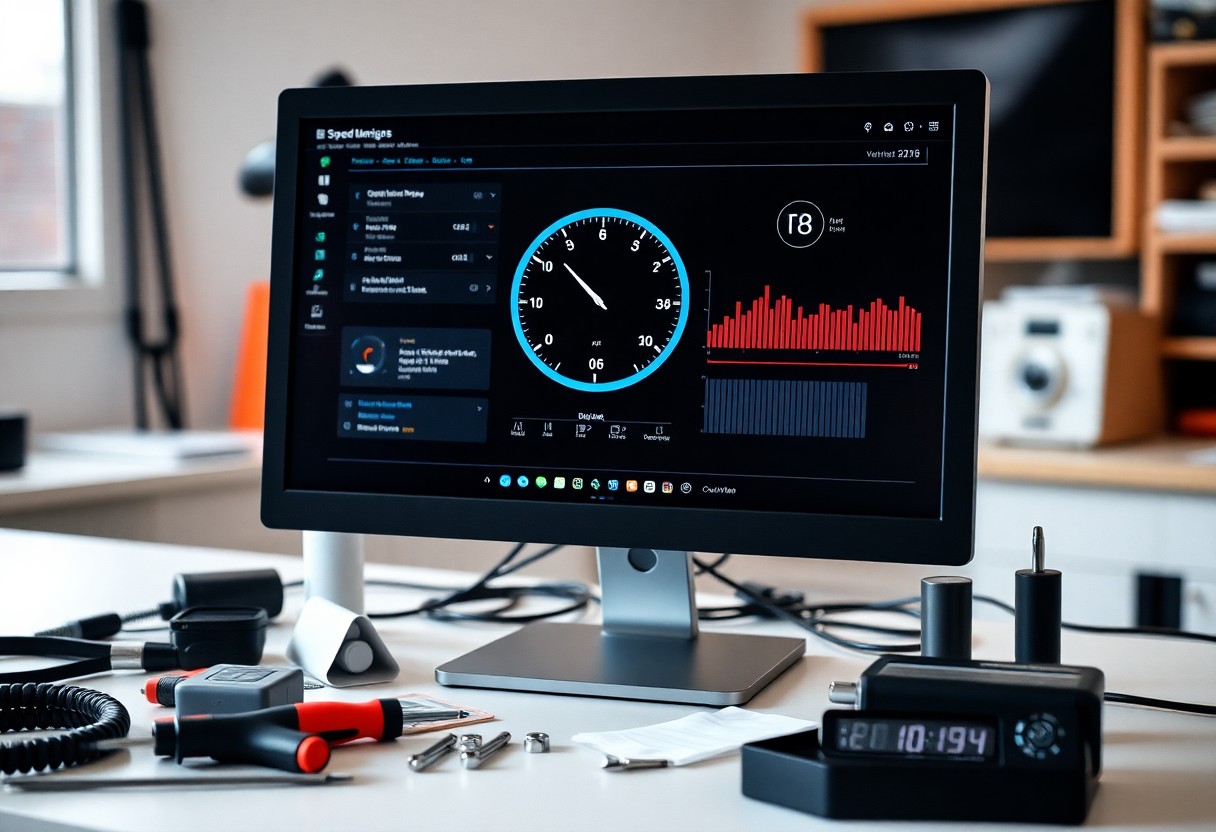There’s nothing more frustrating than a slow PC hindering your productivity. When your computer starts lagging, it’s easy to feel overwhelmed, but don’t worry! This post will guide you through seven quick fixes that can significantly enhance your system’s speed. Whether you’re dealing with excessive background processes, outdated software, or cluttered storage, you’ll find practical solutions to help you regain your computer’s efficiency. Read on to discover how you can optimize your PC and enjoy a smoother experience.

Identify Resource-Intensive Applications
To improve your PC’s performance, it’s imperative to identify applications that consume significant system resources. These resource-intensive applications can slow down your computer’s speed, hindering overall productivity. By pinpointing which programs are demanding the most CPU and memory, you can take appropriate actions to optimize your system’s efficiency.
Task Manager Insights
About your Task Manager, it serves as a powerful tool that provides insight into how your computer’s resources are being utilized. By accessing it, you can view real-time data on CPU, memory, disk, and network usage. Monitoring these metrics will allow you to identify which applications are the main offenders and take steps to address the issue accordingly.
Close Unnecessary Programs
Resource-intensive applications can dramatically impact your PC’s performance. You should actively manage running processes to ensure that only the necessary programs are consuming your resources. Closing these unnecessary applications can free up CPU and memory, resulting in a noticeable increase in your computer’s speed and responsiveness.
Insights into optimization often lie in managing your active applications. By frequently checking Task Manager, you can see which programs are using substantial resources. Once identified, consider closing them if they are not actively in use. This simple step can significantly enhance your computer’s performance, allowing you to enjoy a smoother experience while working or gaming.
Optimize Startup Programs
One of the best ways to enhance your PC’s performance is to optimize startup programs. Many applications automatically launch when you start your computer, consuming valuable resources and slowing down your system. By managing which programs run at startup, you can significantly improve boot times and overall speed, enabling you to get to work faster.
Disable Unwanted Startup Items
Along with optimizing startup programs, it is vital to disable unwanted startup items. Many applications set themselves to launch at startup without your consent, leading to unnecessary strain on your system. By disabling these programs, you can free up memory and CPU resources right from the moment you power on your PC.
Utilize System Configuration Tool
Optimize your PC’s functionality by utilizing the System Configuration Tool. This built-in Windows utility allows you to manage startup items easily, streamlining your boot process. You can access it by typing “msconfig” into the Run dialog box, where you can check and uncheck items to enable or disable them as necessary.
Programs that automatically run during startup can eat into your system’s resources, causing sluggish performance. By using the System Configuration Tool, you can selectively enable or disable these programs, achieving a leaner startup process. This not only improves initial load times but also enhances your PC’s overall responsiveness, allowing you to run your vital applications smoothly and effectively.
Free Up Disk Space
You may not realize it, but excessive files and applications can slow down your PC. To restore optimal performance, routine maintenance is vital. By freeing up disk space, you can speed up your system considerably, allowing it to run smoother and more efficiently. Focus on cleaning up unnecessary files and applications that consume valuable resources, and watch your computer’s responsiveness improve dramatically.
Disk Cleanup Utility
Around your computer, there are likely hidden files that take up space without you knowing it. The Disk Cleanup Utility is a built-in tool in Windows that helps you remove temporary files, system cache, and other unnecessary data. By running this utility regularly, you free up valuable disk space, reduce clutter, and enhance your computer’s performance. It’s a simple yet effective way to keep your PC running efficiently.
Uninstall Unused Applications
Before submerging into the world of digital clutter, take a moment to assess the applications on your PC. If you have programs you no longer use, it’s time to remove them. Uninstalling unused applications not only frees up disk space but also reduces the load on your system’s resources, leading to improved performance. Less is often more when it comes to maintaining a smooth-running computer.
Free space on your hard drive can make a significant difference in your PC’s speed. Each application you uninstall opens up additional resources, allowing your operating system to allocate memory and processing power to the programs you actually use. Take the time to go through your installed applications and eliminate any that don’t serve a purpose anymore. You’ll be surprised at how much speed and responsiveness you gain from this simple task.
Update Software and Drivers
Now is the perfect time to ensure your operating system, applications, and drivers are up to date. Outdated software can harm your computer’s performance, leading to sluggishness and security vulnerabilities. Regular updates can help you harness the latest features and improvements, and they often include important bug fixes that contribute to overall system stability. By keeping everything current, you improve your PC’s efficiency significantly, paving the way for a smoother user experience.
Importance of Regular Updates
To maintain optimal performance, you should prioritize regular updates for your software and drivers. Updates often come with performance enhancements and crucial bug fixes that can help your PC run smoother and faster. Additionally, staying up-to-date with security patches protects your system against emerging threats, ensuring your data remains safe and your computer functions at its best.
Managing Driver Updates
Below are some effective strategies for managing driver updates to keep your PC running efficiently. Many drivers can be updated automatically through Windows Update or by using dedicated software from the manufacturer. It’s best to periodically check for updates manually, particularly for critical components like graphics cards, network adapters, and peripherals, as these can significantly affect your overall experience.
Regularly updating your drivers is vital for maximizing your system’s performance. By taking advantage of manufacturer websites or device management tools, you can ensure that all components function optimally. This practice not only prevents conflicts caused by outdated drivers but also enhances compatibility with new software and enhances the effectiveness of your hardware. Establishing a routine for checking updates will help keep your system running smoothly and efficiently.
Scan for Malware and Viruses
Not all slow PCs suffer from hardware issues; often, malware and viruses can be the hidden culprits. These unwanted programs can consume your system’s resources, causing significant slowdowns. By scanning your computer for these threats, you can identify and eliminate the specific software that is dragging your performance down.
Run a Full System Scan
To effectively remove potential threats, you should run a full system scan with your antivirus program. This will thoroughly check all files and processes on your computer, ensuring no malicious software is overlooked. A comprehensive scan not only finds existing threats but also helps to prevent future infections by keeping your security software up to date.
Use Trusted Antivirus Software
Among the many tools available, selecting trusted antivirus software is necessary for maintaining your PC’s health. Quality antivirus programs provide real-time protection and regular updates to safeguard your system against the latest threats. They often include features such as scheduled scans and web protection, which can significantly enhance your overall security posture.
With trusted antivirus software, you gain peace of mind knowing that your system is being continuously monitored for threats. Many reliable programs offer intuitive interfaces that make scanning and managing quarantined files straightforward. Additionally, a reputable antivirus will provide regular updates to its virus definitions, ensuring that you are protected against emerging threats, thus improving your computer’s performance and longevity.
Upgrade Hardware for Enhanced Performance
All computers can benefit from hardware upgrades to boost speed and performance. If you notice your PC lagging, investing in new components could be the solution. Whether it’s increasing your RAM or switching to a faster storage device, these enhancements can make a significant difference in how your system runs. Let’s explore some effective upgrades that can help you get the most out of your computer.
Consider Adding More RAM
At times, your PC may run slow due to insufficient memory. Adding more RAM can enhance your system’s ability to multitask and run demanding applications efficiently. This is especially beneficial if you frequently work with large files or run resource-heavy software, allowing for smoother performance overall.
Replace HDD with SSD
After noticing sluggish performance, one of the best upgrades you can make is replacing your traditional hard disk drive (HDD) with a solid-state drive (SSD). An SSD significantly increases read and write speeds, resulting in faster boot times and quicker file access. This upgrade will noticeably improve your computer’s responsiveness, making everyday tasks more efficient and enjoyable.
To maximize your computer’s potential, upgrading from an HDD to an SSD can be a game-changer. With an SSD, you can experience almost instant boot-up times and reduced loading durations for applications, meaning less time waiting and more time being productive. Furthermore, SSDs are more reliable and consume less power than HDDs, making them a smart choice for enhancing your overall computing experience.
To wrap up
Hence, addressing a slow PC is manageable with the right strategies. By following these seven quick fixes, you can enhance your computer’s performance and ensure a smoother user experience. Regular maintenance, such as optimizing your storage, managing startup programs, and updating software, will keep your system running efficiently. Implement these tips, and you’ll enjoy a faster, more productive computing experience.



